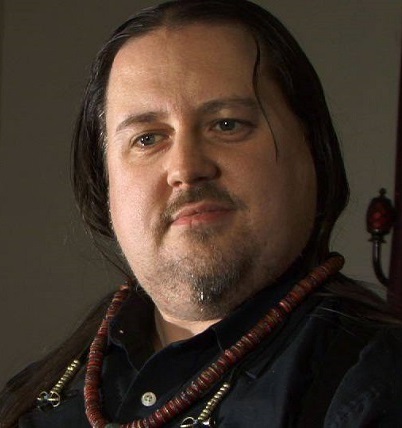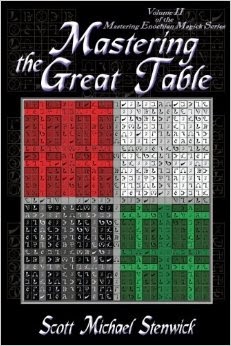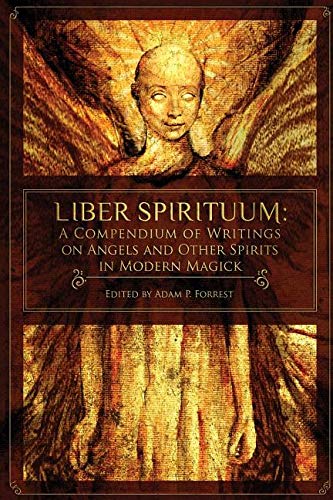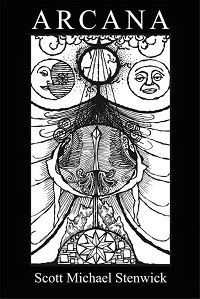This article is a response to this post over on Talking About Ritual Magick, and is essentially an expanded version of my comment which you can read over there. Frater Barrabbas begins with what I think is a completely reasonable denunciation of hucksters in the occult community peddling magick as an end-all, be-all, instant panacea - to anyone who is willing to pay up. The New Age community went through that whole thing back in the 1970's, and what emerged was a culture of ten thousand dollar "become an instant shaman" weekend retreats. As serious magicians and occultists, we would be wise not to repeat that nonsense.
At the same time, though, I think the post goes a little too far in the opposite direction. Maybe it's something that I'm reading into it, but parts of it come off as a little dismissive of practical magick in general. I'll freely admit to having a bit of a chip on my shoulder regarding that perspective - I have heard it many times over the years from people who start out doing magick and get heavily into mysticism and/or meditation. Now I don't think there's anything wrong with either of those approaches, and there's also nothing wrong with deciding that practical work is not really your thing. But it is mine, and I never have understood why for some, the result of mystical work seems to be that they feel a need to denigrate the practices of others.
To be clear, I do not think that this is what Frater Barrabbas is doing. He's saying that from a non-dual perspective, practical magick is essentially pointless - and to be fair, this is entirely true. However, this is also true of striving for anything in your life, not just magick. Through meditation and mysticism it is true that you can train the mind to accept almost anything. Former OTO head Karl Germer famously relied on his mystical training to help him survive a Nazi concentration camp during World War II. And sometimes it's easier to train yourself to accept your place in the world than it is to transform your situation.
But should you? I'm convinced that the answer there is not "always," but it also is not "never." It's somewhere in between, and I have run into too many folks over the course of my life who at some point in their magical career have decided that "always" really is the best answer. I agree with the general principle that the eventual goal of magick is self-transformation and mystical attainment, but why not make your life circumstances better along the way? It also seems to me that practical work can sometimes reveal the nature of your will more simply and elegantly than meditation can. It gives you a benchmark for your practice that is objectively measurable, which is generally not the case with more subjective mystical work.
We are getting closer to measuring meditative states with brainwave monitors, functional MRI's, and other related technology, but we're not quite there yet. So if we want experimental results, the world has to serve as our laboratory. Again, from a non-dual perspective that's pointless, but I'm a scientific illuminist and that means I think like a scientist about all this stuff. Propose a hypothesis, test a hypothesis, and measure the results. I also believe it is important to have some semblance of peer review in order to evaluate those results and build up a body of knowledge. My hope is that future generations will be able to build on our results and not be stuck re-inventing everything.
Practical magick is not some special case - it's a human skill like any other. One could argue from a non-dual perspective that there was never any real point in my learning the complex technical skills that make me good at my job, because in the Buddhist system striving is grasping and grasping is one of the roots of suffering. Everything I've built is impermanent, and I'll die someday no matter what I accomplish. But so what? There's a big difference between what I would experience living in a crappy apartment working a low-paying job, and the life I've built for myself over the years. I see practical magick precisely the same way. The science is in the how, and the art is in the why, and I am of the opinion that regardless of whether any "permanent" objective is achieved, the point of it is the journey and how creative you are along the way.
One thing I will say is that if someone came to me and told me that their only goal was to awaken their consciousness, become enlightened, or some similar goal I probably would tell them to go study a system like Buddhism instead of magick. In my opinion, the Buddhist system for teaching meditation is more robust and comprehensive than what we have in the western system. On the meditation side, western magick is still catching up to where the Buddhists have been for centuries, and that work really only started about a hundred and fifty years ago with the Theosophical society. Since the real strength of western magick is on the practical side, if that's not what you're interested in doing, it seems to me that there's little point in struggling through learning its greater complexity.
I also disagree with the notion that we somehow started out as enlightened, fully-aware beings and then somehow became corrupted or conditioned by the world around us. That's a belief that supports the admittedly compelling idea that all we have to do is "uncondition ourselves" and we'll be good to go. But does anybody here really think an infant is enlightened? I have children, and I sure don't. That's one of those messed-up ideas that came into our culture via psychoanalysis. In fact, enlightened, coherent consciousness is constructed by spiritual practice - which you may recognize as Ken Wilber's "Up from Eden" model of spiritual development. To me that model makes a lot more sense than "unconditioning only" systems that have been floating around the occult world for a while now.
My last point is that in today's world, "unearned" is a very fungible concept. Sure, a lot of beginners want practical magick that is super-easy to do and produces big results, and that sort of thing is the esoteric equivalent of snake oil. Effective practical magick takes work. But it also is true that hardly anybody at the top of our society "earned" their way there in any meaningful sense. They either inherited a bunch of money, or were in the right place at the right time and took advantage of an essentially random opportunity. You can find a few cases of self-made successful people, but really, as the years go on they have become fewer and further between.
The practical magician in me says that since "unearned" stuff is handed out pretty much randomly to people all the time, I'm going to do some practical work to make it more likely that I'm one of those people. And I could also make the argument that the fact that I did the magical work in the first place means that I did more to "earn" it than an individual who just stumbled upon it. And as far as gnosis and self-transformation goes, focusing on anything as your object of meditation will eventually lead you to enlightenment. But in the meantime, why not cultivate practical skills that will help you enjoy the journey more? Even in Buddhism, they say "may all beings have happiness and the causes of happiness." Why neglect the latter?
Now let me wrap this all up with what I'm not saying. I'm not saying that practical magicians shouldn't do mystical practice. Meditation, for example, is invaluable mind training that's hard to get from other approaches. As I see it, magick and mysticism work together to reinforce each other, or at least they should. At any given time, it can also be completely legitimate to focus on one at the expense of the other. That has to do with your own personal spiritual path, and what is in harmony with your will at any given moment.
So it would be silly for me to argue that the mystics are doing it wrong, just like it's ridiculous when mystics say the same about practical magicians. Everyone's path is personal, and what works for one may very well not work for another. Just do your own work, and experience the results for yourself - whatever approach you decide to take.
At the same time, though, I think the post goes a little too far in the opposite direction. Maybe it's something that I'm reading into it, but parts of it come off as a little dismissive of practical magick in general. I'll freely admit to having a bit of a chip on my shoulder regarding that perspective - I have heard it many times over the years from people who start out doing magick and get heavily into mysticism and/or meditation. Now I don't think there's anything wrong with either of those approaches, and there's also nothing wrong with deciding that practical work is not really your thing. But it is mine, and I never have understood why for some, the result of mystical work seems to be that they feel a need to denigrate the practices of others.
To be clear, I do not think that this is what Frater Barrabbas is doing. He's saying that from a non-dual perspective, practical magick is essentially pointless - and to be fair, this is entirely true. However, this is also true of striving for anything in your life, not just magick. Through meditation and mysticism it is true that you can train the mind to accept almost anything. Former OTO head Karl Germer famously relied on his mystical training to help him survive a Nazi concentration camp during World War II. And sometimes it's easier to train yourself to accept your place in the world than it is to transform your situation.
But should you? I'm convinced that the answer there is not "always," but it also is not "never." It's somewhere in between, and I have run into too many folks over the course of my life who at some point in their magical career have decided that "always" really is the best answer. I agree with the general principle that the eventual goal of magick is self-transformation and mystical attainment, but why not make your life circumstances better along the way? It also seems to me that practical work can sometimes reveal the nature of your will more simply and elegantly than meditation can. It gives you a benchmark for your practice that is objectively measurable, which is generally not the case with more subjective mystical work.
We are getting closer to measuring meditative states with brainwave monitors, functional MRI's, and other related technology, but we're not quite there yet. So if we want experimental results, the world has to serve as our laboratory. Again, from a non-dual perspective that's pointless, but I'm a scientific illuminist and that means I think like a scientist about all this stuff. Propose a hypothesis, test a hypothesis, and measure the results. I also believe it is important to have some semblance of peer review in order to evaluate those results and build up a body of knowledge. My hope is that future generations will be able to build on our results and not be stuck re-inventing everything.
Practical magick is not some special case - it's a human skill like any other. One could argue from a non-dual perspective that there was never any real point in my learning the complex technical skills that make me good at my job, because in the Buddhist system striving is grasping and grasping is one of the roots of suffering. Everything I've built is impermanent, and I'll die someday no matter what I accomplish. But so what? There's a big difference between what I would experience living in a crappy apartment working a low-paying job, and the life I've built for myself over the years. I see practical magick precisely the same way. The science is in the how, and the art is in the why, and I am of the opinion that regardless of whether any "permanent" objective is achieved, the point of it is the journey and how creative you are along the way.
One thing I will say is that if someone came to me and told me that their only goal was to awaken their consciousness, become enlightened, or some similar goal I probably would tell them to go study a system like Buddhism instead of magick. In my opinion, the Buddhist system for teaching meditation is more robust and comprehensive than what we have in the western system. On the meditation side, western magick is still catching up to where the Buddhists have been for centuries, and that work really only started about a hundred and fifty years ago with the Theosophical society. Since the real strength of western magick is on the practical side, if that's not what you're interested in doing, it seems to me that there's little point in struggling through learning its greater complexity.
I also disagree with the notion that we somehow started out as enlightened, fully-aware beings and then somehow became corrupted or conditioned by the world around us. That's a belief that supports the admittedly compelling idea that all we have to do is "uncondition ourselves" and we'll be good to go. But does anybody here really think an infant is enlightened? I have children, and I sure don't. That's one of those messed-up ideas that came into our culture via psychoanalysis. In fact, enlightened, coherent consciousness is constructed by spiritual practice - which you may recognize as Ken Wilber's "Up from Eden" model of spiritual development. To me that model makes a lot more sense than "unconditioning only" systems that have been floating around the occult world for a while now.
My last point is that in today's world, "unearned" is a very fungible concept. Sure, a lot of beginners want practical magick that is super-easy to do and produces big results, and that sort of thing is the esoteric equivalent of snake oil. Effective practical magick takes work. But it also is true that hardly anybody at the top of our society "earned" their way there in any meaningful sense. They either inherited a bunch of money, or were in the right place at the right time and took advantage of an essentially random opportunity. You can find a few cases of self-made successful people, but really, as the years go on they have become fewer and further between.
The practical magician in me says that since "unearned" stuff is handed out pretty much randomly to people all the time, I'm going to do some practical work to make it more likely that I'm one of those people. And I could also make the argument that the fact that I did the magical work in the first place means that I did more to "earn" it than an individual who just stumbled upon it. And as far as gnosis and self-transformation goes, focusing on anything as your object of meditation will eventually lead you to enlightenment. But in the meantime, why not cultivate practical skills that will help you enjoy the journey more? Even in Buddhism, they say "may all beings have happiness and the causes of happiness." Why neglect the latter?
Now let me wrap this all up with what I'm not saying. I'm not saying that practical magicians shouldn't do mystical practice. Meditation, for example, is invaluable mind training that's hard to get from other approaches. As I see it, magick and mysticism work together to reinforce each other, or at least they should. At any given time, it can also be completely legitimate to focus on one at the expense of the other. That has to do with your own personal spiritual path, and what is in harmony with your will at any given moment.
So it would be silly for me to argue that the mystics are doing it wrong, just like it's ridiculous when mystics say the same about practical magicians. Everyone's path is personal, and what works for one may very well not work for another. Just do your own work, and experience the results for yourself - whatever approach you decide to take.

























No comments:
Post a Comment